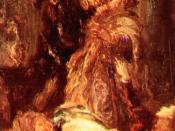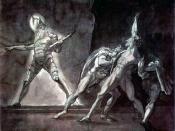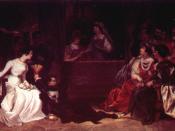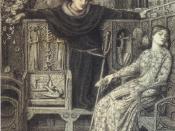Control the Animal Inside of You Have you seen Mountain Dew's newest commercial? This commercial pits a ram against a human being in a battle of head butting. Because the ram stands between the man and his soda drink, the man challenges the ram to a head-butting match in order to attain the drink. What do you think advertisers wanted to portray in this ad? There may not be a physical animal inside of you, but there certainly are animal instincts present. In Hamlet, by William Shakespeare, characters become overly obsessed to achieve their wants, and once one's desire consumes the soul, it leads to a chain reaction of uncontrollable animalistic behavior. This animalistic behavior then disrupts the balance of life and causes chaos. Only when these desires and beastly manners are removed, life again becomes peaceful and undisturbed.
Shakespeare's hero, Hamlet, was touted as the prince of Denmark and even possible heir to the throne.
But after the death of his father King Hamlet, Claudius takes the throne. Not only has Claudius taken the throne, but he has also taken his father away from Hamlet. Hamlet's vow for vengeance truly emerges as an animal instinct. Hamlet becomes mad and his obsession for retaliation becomes too strong to control. When one is obsessed with an idea or object, his mindset is solely focused on that one thing. Determination may be similar, yet however obsession leads to many actions that disrupt life's balance. So obsessed was Hamlet that he even neglected the love he had with his love Ophelia. He chose to seek revenge rather than love. In Hamlet's case, he would stop at nothing to take revenge for his father's death.
Just as the vision of a wounded animal becomes distorted, Hamlet's indecision and fear paralyze him. He makes rash decisions, and it leads to many consequences. For example, Hamlet mistakenly kills Polonius because he thought it was Claudius who was spying on him. He even threatens his mother's life. Hamlet's desire for vengeance truly played a vital part in disrupting balance. He brought about certain actions that ultimately became a chain reaction of deaths.
Life was pure and peaceful. There were neither internal struggles nor battles to face. However, once Hamlet allowed revenge to enter his heart, his total perspective on life changed. Claudius says this about Hamlet, "Something have you heard of Hamlet's transformation, so call it, sith nor th' exterior nor the inward man resembles that it was. What it should be"æthat thus hath put him so much from th' understanding of himself I cannot dream of. (Act2 Sc2 ln. 4-10) Hamlet's total appearance changed. Rather than approach vengeance as a task to be carried out in the most acceptable fashion, Hamlet fixes himself on murder as the only means of revenge. Unfortunately, this decision ultimately destroys him. What was ironic about Hamlet was that by accomplishing his revenge, he destroyed the family whose honor he sought to avenge. His mother and he both die, and even the woman who was to bear his children (Ophelia) dies also. It was not until these untimely deaths occur did peace again exist.
Claudius, too, displays animalistic behavior throughout the story. Claudius allowed his desire for the throne to overtake him. To prove how animalistic he was, Claudius killed his own brother to attain the crown. Claudius made the mistake of killing his brother. That was the start of a chain reaction that once again leads to disruption of balance. Hamlet already had his mind set on revenge, and to make matters worse, Claudius marries Hamlet's mother Gertrude just one month after the death of Old King Hamlet. What was Claudius thinking? Quite frankly, Claudius causes his own downfall.
Claudius also possessed the animal instinct of "survival of the fittest"ÃÂ. Threatened by Hamlet's desire to find his father's killer, Claudius is forced to be on guard and to devise a way to eliminate Hamlet. This leads to many different plans to murder Hamlet in order to secure the throne. Treachery and unscrupulous scheming are not innate characteristics. But when obsession takes over the mind and heart, these things start to develop. Claudius devised numerous plans to kill Hamlet. Claudius craftily plans a scheme to eliminate Hamlet by sending him to England. When that attempt fails, Claudius again plots a duel between Hamlet and Laertes. On top of that, Claudius tries to ensure Hamlet's death by dropping a poisoned pearl into a cup of wine intended for Hamlet. In the end, Claudius' emotions and insecurities down him. His desire for the throne consumes him, and it leads to a chain reaction of violence and chaos.
Both Hamlet and Claudius exhibit animalistic characteristics throughout the book. Both allowed their wants and desire to engulf their minds and hearts. They both focused solely on those wants and they stopped at nothing to achieve them. So obsessed with their desires, they failed to realize the consequences of their actions. This ultimately leads to a chain reaction of violence and imbalance. Throughout the story, it became a battle of wits and cunningness. Both strategized and devised plans to remove the other. Both would stop at nothing to kill the other. It was not until then that peace and balance would once again exist.
Ultimately in the midst of all this chaos, both Hamlet and Claudius failed to realize that their friends and loved ones were killed as well. Fortinbras who stood smartly aside amidst Hamlet's and Claudius' fighting, ultimately assumed the throne. He lost his father in battle as well, yet he did not let desire consume him. Rather than seek revenge, he exploited Hamlet and Claudius' downfalls to his advantage. Once one's desire consumes the soul, it leads to a chain reaction of uncontrollable animalistic behavior. This animalistic behavior then disrupts the balance of life and causes chaos. Only when these desires and beastly manners are removed, life again becomes peaceful and undisturbed. William Shakespeare wanted to illustrate and warn his readers: never let the animal inside take control of you.





